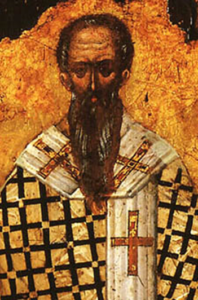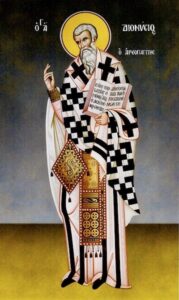Hieromartyr Dionysius Oct 3/Nov. 19 – A Biblical Figure (Acts 17: 34) – The Areopagite, Bishop of Athens.

Dionysius, the Areopagite a Biblical figure (Acts 17: 34), was a judge at the Areopagus Court in Athens, who lived in the first century. He was born around the year A.D. 9, in a rich and noble family. He lived originally in the city of Athens at the time of the Apostles and was raised there receiving a classical Greek education. Dionysius was a highly educated philosopher of Greece, which had leading educational centres of the city of Athens. On his return to Athens from Egypt and based on his wisdom and virtue pagan learning earned him, to be chosen as one of the nine counsellors of the Areopagus Council, (Athenian high court) and parliament of the city. Areopagus in Greek is Areios-pagos which was ‘the hill of Ares’ located to the west of Acropolis in Athens. The court, at a place, the council or court of justice met in the open air on the hill. Areopagite denotes that Dionysius was a member of the Court.

He travelled to Heliopolis in Egypt to learn mathematics and astrology. It was in Heliopolis, he saw for himself, in his early twenties, along with his friend Apollophonos witnessed the solar eclipse that occurred, at the time of the death of the Lord Jesus Christ by Crucifixion. This eclipse of the sun was contrary to all the laws of nature, which occurred at the death of the Son of God (Lk. 23: 44-45). His teachers could not explain it to him other than as a sign of changes in divine matters.
While a judge at the Areopagus Court in Athens, he had invited the great Champion Apostle Paul, whom the Holy Spirit had brought to the city, to proclaim the good tidings of Salvation. Many of those who heard the speech of St. Paul became followers of Paul, who stood up in the meeting of the Areopagus and said: “People of Athens! I see that in every way you are very religious. For as I walked around and looked carefully at your objects of worship, I even found an altar with this inscription: ‘to an unknown God’. So, you are ignorant of the very thing you worship — and this is what I am going to proclaim to you” (Acts 17: 22-23). St. Paul tent-maker clearly showed that the unknown God, whom their unassisted reason had given them a vague notion of, was the Lord of heaven and earth, who made the world and everything in it, and who does not live in temples made by hands, as though he needed anything, since he himself gives to all men life, and breath and everything (Acts 17: 24-25).
St. Paul told them that man is made in the image of God and is called upon to share the divine life in the very Son of God, Jesus Christ, who has taken our flesh has risen from the dead and will come to judge the world. When St Paul spoke of the Saviour’s Passion and of the events that occurred at his death, Dionysius recalled the solar eclipse, inexplicable to astronomers. Many disbelieved and mocked St Paul on hearing about the Resurrection of the dead, as a false wisdom of this world had completely darkened their minds. However, the hearts of several among them, including St Dionysius were touched by these words of eternal life, and they believed.
St Dionysius was baptised and converted to Christianity by the preaching of St Paul in Athens. He accepted his salvific proclamation and became a Christian. For three years St Dionysius remained a companion of the holy Apostle Paul in preaching the Word of God. Dionysius made number of journeys outside Greece, and it is believed that he was present when the Apostles assembled at the glorious repose and Assumption of the Mother of God. He wrote about the Theotokos, and he became a friend of St John, the Disciple and corresuccessors.th St. Timothy, St. Titus, St. Polycarp and others of the Apostles’ successors.
Later, the Apostle Paul selected him as bishop of the city of Athens as recorded by Eusebios. In his letters to Saint Polycarp of Smyrna (A.D. 69-155) he says that the astrologer he questioned had answered him rather by divine inspiration than by any natural knowledge. And he himself had cried out: Either the God of nature is suffering, or the entire mechanism of the world is going to be destroyed to return to its ancient state of chaos!
During the lifetime of the Mother of God, Saint Dionysius had journeyed from Athens to Jerusalem to meet Her. He wrote to his teacher the Apostle Paul: “I witness by God, that besides the very God Himself, there is nothing else filled with such divine power and grace. No one can fully comprehend what I saw. I confess before God: when I was with John, who shone among the Apostles like the sun in the sky, when I was brought before the countenance of the Most Holy Virgin, I experienced an inexpressible sensation. Before me gleamed a sort of divine radiance which transfixed my spirit. I perceived the fragrance of indescribable aromas and was filled with such delight that my very body became faint, and my spirit could hardly endure these signs and marks of eternal majesty and heavenly power. The grace from her overwhelmed my heart and shook my very spirit. If I did not have in mind your instruction, I should have mistaken Her for the very God. It is impossible to stand before greater blessedness than this which I beheld.”
The writings of Saint Dionysius the Areopagite hold great significance for the Orthodox Church. Four books of his have survived to the present day: On the Celestial Hierarchy, – the Christian teaching about the angelic world. Here he speaks of, the angelic (or Celestial-Heavenly) hierarchy comprises the nine angelic Ranks: Seraphim, Cherubim, Thrones, Dominions, Powers, Authorities, Principalities, Archangels, Angels. On the Ecclesiastical Hierarchy – is a continuation of his book on the Celestial Hierarchies. The Church of Christ, like the Angelic ranks, in its universal service is set upon the foundation of priestly principles established by God. On the Names of God – he expounds upon the way of divine knowledge through a progression of the Divine Names. On Mystical Theology, he sets forth the teaching about divine knowledge. The theology of the Orthodox Church is totally based upon experience of divine knowledge. In order to know God, it is necessary to be in proximity to Him, to have come near to Him in some measure, so as to attain communion with God and deification (Theosis), a condition is accomplished through prayer and close proximity to the incomprehensible Go. Only with purity of heart in true prayer brings us closer to God. In addition, there are ten letters to various people.

After the death of the Apostle Paul, St Dionysius continued his work, and went off preaching in the West, accompanied by other Presbyters and Deacons. They converted many to Christ at Rome, Germany, Galatia, and Spain. In Gaul, during a persecution against Christians by the pagan authorities, all three confessors were arrested and thrown into prison. By night Saint Dionysius celebrated the Divine Liturgy with angels of the Lord. In the morning the martyrs were beheaded. According to an old tradition, Saint Dionysius took up his head, proceeded with it to the church and fell dead there. A pious woman named Catulla buried the relics of the saint and that many miracles were worked at his grave. He suffered a Christian Martyr end and is the patron saint of Athens and is venerated as the protector of the Judges and the Judiciary.
A liturgy and some prayers of the order of Baptism are ascribed to Dionysius Areopagite (Aphrem I, 2003). The feast of St. Dionysius Areopagite is celebrated on 19 November and October 3.
0 Comments